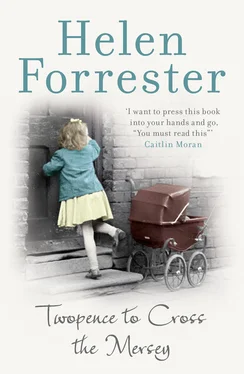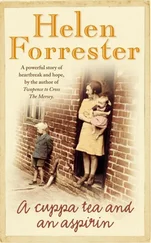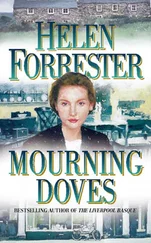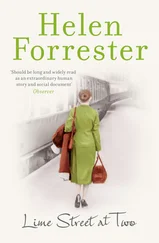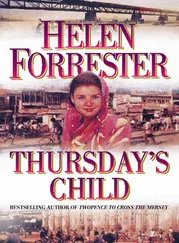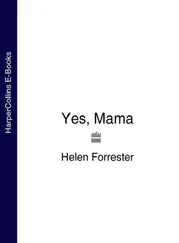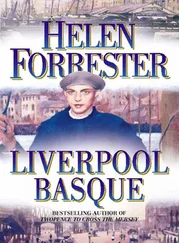Mother looked around her in despair.
‘Nobody’d take seven children nowadays,’ puffed Mrs Foster, as they descended the stairs once more.
Mother knew this to be true and, since the accommodation represented at least a roof under which to shelter, she said, ‘I appreciate that, and I will take the rooms.’
They went back to Mrs Foster’s room, a rent book was carefully made out and Mother paid over a week’s rent. She was informed that she could hang clothes out to dry in the tiny, overgrown back garden, but the children could not play there because, to quote Mrs Foster: ‘Me brother faces out back and he can’t stand noise – he’s a professional pianist. He used to play reelly well in a cinema.’
Mother sighed. She must have been sickened by the squalor of the place. She asked how to reach our present rooms by bus and found that a tram went from a nearby corner.
The trams were open at the front and back and the driver in a shabby uniform augmented by a huge scarf round his neck stood exposed to wind and rain, his foot for ever on his clanging bell. The conductor, not quite so well armoured against the elements, heaved young and old on and off, crammed the vehicle with loud admonitions to ‘Move farther daan t’ back there and make some room for them as comes atter yer’, and collected the fares into his leather pouch with jingling efficiency, as he shoved and pushed his way between his close-packed passengers.
As she sat swaying in the noisy vehicle, Mother watched them work and realized that Mrs Foster had not asked if Father was employed or not; we discovered later that she had taken it for granted that he was not.
Darkness had long since fallen when Mother at last staggered into our living-room and collapsed on to the settee.
Half an hour after moving into our new abode on the following Monday, we began to appreciate some of the difficulties of living there.
Our coal was to be kept in a cupboard by the back door of the basement, where a series of old pantries had been converted for this purpose. This meant that every bucketful had to be carried up sixty-four stairs. We were to share the bathroom on the first floor with eleven other residents, and this meant innumerable trips for me up and down thirty-two stairs, since Brian, Tony and Avril were far too scared of the dark staircase and crypt-like, filthy bathroom to go down alone, and they needed help to manage in such a dirty place. I was getting resigned to disgusting bathrooms – they seemed to be part of the way of life in Liverpool, as I saw it.
The gas for the light in the living-room, and for a gas stove if we had had one to put in, came through a slot meter which ate pennies at an alarming rate. We did not know that such subsidiary meters were installed and set by landlords at the highest rate they thought they could squeeze out of their tenants. The landlords emptied these meters. They had only to pay the gas company the amount calculated on the reading of the main house meter in the basement, and they pocketed quite a substantial profit on this transaction, in addition to their rent. A more worldly-wise person than my mother would have inserted a penny and run the gas, to see how long a penny lasted, before accepting the tenancy.
Father went out and stopped a passing coal-cart, and the man brought in a sack of coal. He then went to buy cigarettes at a tiny corner store. Both he and Mother had been heavy smokers and found their enforced abstinence hard to bear.
We had brought with us on our tram journey a little oatmeal, a few potatoes, sugar and tea. There was still some baby food for Edward, and, since it was late afternoon by the time we arrived and Edward was whimpering, I made a bottle of formula and then some porridge for the other children. Alan had managed to get a smoky fire going, having lugged a handleless bucket full of coal upstairs by hugging it to his chest. His shirt, already dirty from a week’s wear, was now streaked with coal dust.
Although my head was throbbing and my throat was very sore, I ate some porridge gratefully.
As there was no hot water in the bathroom, I afterwards heated pans of water on our fire, and, starting with Avril, washed all the children, except Alan, who washed himself. Little Tony, fair and silent like Fiona, felt very hot, too, and I sat him on my knee and got him back into his grubby clothes as fast as possible.
I tucked Alan, Brian and Tony up in the bed in the attic, spreading over them their three overcoats, and left them squabbling with each other regarding the fair distribution of room in the bed.
My weary mother had been resting on the bed in the bedroom, and we now held a hasty debate about where Fiona, Avril and I should sleep, it being tacitly agreed that Mother, still in pain, had to have a bed. After a long argument, Father and I brought down into the bedroom the old door which had been left in the attic. We propped this up at each corner with a pile of long-forgotten Victorian books taken from the bamboo bookcase, and then covered it with crumpled newspaper found in the wardrobe. Avril had a wonderful time chasing the spiders we dislodged from the bookcase when we took the books out. She was delighted that Fiona, she and I were going to share this improbable bed. Father and Edward would share Mother’s bed.
Mother got up and went into the living-room, while I put Avril to bed, and when I joined my parents later, they were quietly muttering reproaches at each other through clouds of cigarette smoke. The problem was that we had only three shillings left from our parish relief, and we had to live, somehow, nearly three more days until Thursday afternoon when the benevolent parish would disgorge another forty-three shillings.
As I entered they broke off their recriminations and Father told me to go to bed. I went, thankfully, clinging to Fiona because I felt so dizzy. Fiona, as she took off her shoes preparatory to crawling in beside a soundly sleeping Avril, was crying silently as if her heart was already broken. Avril refused to make room for us when we pushed her gently, and grumbled drowsily that it was her bed. Desperate with the need to lie down, I slapped her legs and, with a howl and an occasional kick at her not-too-loving sisters, she made way.
With nothing over us except our overcoats, and only newspaper under us, it was unbearably cold, and yet at times I felt dreadfully hot.
After a broken night of bad dreams, through which I could hear Edward crying steadily most of the time, I staggered out of bed when Mother called me. I could hardly speak and my throat was swollen from ear to chin.
With eyes still closed she told me in a whisper to call the others, get them ready for school, cut them some bread to eat and make some milkless tea to drink.
Obediently, I built a fire and when I had fanned it with a newspaper into some semblance of heat, I put a pan of water on to it for the tea. Fiona got up from her rustling couch, leaving Avril still slumbering, and without being bidden, went downstairs to wash in the bathroom.
‘The Minister’s soap is nearly finished,’ she reported as she brought the remains of the tablet back to me.
I went upstairs to call the boys and clung to the rickety banister because of the dizziness that enveloped me. The boys were not making their usual rumpus, and I found Alan anxiously surveying a tearful Tony, whose neck was as swollen as mine, while Brian, his small brown face looking wizened and old, was lying miserably on the mattress and saying that he didn’t feel well and he wanted to go home.
‘I’ll tell Mother,’ I said, through nearly closed lips. I noticed, in terror, that we all seemed to have very large red spots on us – mine itched abominably.
Mother looked so utterly defeated when I told her about the boys and when she had really looked at me that my heart went out to her. She woke Father, who had been sleeping the deep sleep of exhaustion.
Читать дальше
